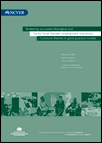Description
Helping Aboriginal and Torres Strait Islander job-seekers find and keep a job has been the focus of recent reforms announced by the Australian Government. This report describes seven essential characteristics of employment service organisations that lead to successful employment outcomes for their Indigenous clients. The report and accompanying guide (see related items) describe how these factors are implemented in practice, with the aim to enable other employment service providers to build their own capacity to provide positive employment outcomes for their Aboriginal and Torres Strait Islander clients.
Summary
Executive summary
Context and aims of research
Against a background of review and changes to employment services nationally and the need to close the gap in employment outcomes between Indigenous and non-Indigenous Australians, the National Centre for Vocational Education Research (NCVER) commissioned the Cultural and Indigenous Research Centre Australia to undertake research on factors leading to successful employment outcomes for Aboriginal and Torres Strait Islander people. The research was overseen by the National VET Indigenous Advisory Taskforce.
The research was designed to provide information for organisations across Australia working to achieve good employment outcomes for Aboriginal and Torres Strait Islander Australians. Improving employment outcomes can also lead to better social and economic wellbeing for this group of Australians, at the same time as changing attitudes in the broader community.
The nine organisations (mainly employment services organisations) included in the research varied considerably in their services, structures and locations (urban, regional and remote parts of Australia). Some were registered training organisations or working with registered training organisations, while others were Job Network providers. Some ran their own businesses/ enterprises, and others had a mixture of services, including health, tenancy and recruitment. Some were large (with more than 140 employees nationally), while others were small (with four full-time staff). Several organisations were Aboriginal and Torres Strait Islander owned and managed, and others were not, although all have Aboriginal and Torres Strait Islander staff.
We know that Aboriginal and Torres Strait Islander Australians are underrepresented in the workforce, have lower household incomes than other Australians, have higher unemployment rates and are more likely to live on welfare payments (Australian Bureau of Statistics [ABS] 2006). Indigenous job-seekers face multiple barriers such as poor health, low levels of education and a lack of opportunities in areas of limited economies.
Several studies and evaluations of successful employment programs and organisations have
identified factors common to successful practice and include:
- targeted and integrated training
- knowledge of client group and its context
- provision of mentoring and support
- partnerships and connections
- community involvement
- skilled and dedicated staff
- specialist strategies for Aboriginal and Torres Strait Islander people
- innovation
- promotion of success.
These factors, identified by the literature, became the key areas of focus when consulting with
organisations involved in the research.
Research findings
The research identified the characteristics common to most of these organisations and which were helping them to achieve outcomes for Aboriginal and Torres Strait Islander job-seekers. These common characteristics offered important additions to the factors identified by the literature and provided case studies to exemplify how these factors operate in practice. The characteristics or factors were categorised as essential and desirable, with those that were common across all of the organisations involved in the research considered as essential for achieving success. Desirable factors were those that were not found to be operating in all organisations but, for those organisations where they were, were considered to be contributing to success. These factors include:
Essential
- having strong vision and understanding the importance of monitoring targets
- responding to the employment market
- maintaining strong relationships with community and business
- offering ‘job related’ and culturally appropriate training
- collaborating with Aboriginal and Torres Strait Islander leaders and the community
- providing holistic support
- ensuring strong staff commitment.
Desirable
- tailoring available funding to suit individual needs
- providing employment opportunities through internal enterprise
- learning from other organisations
- having alternative sources of funding.
The research found that these factors were interrelated. For example, organisations that are aware and take advantage of the diversity of funding opportunities are in a better position to ‘sell’ their clients to employers, and, combined with knowledge of the jobs market, they are better able to target their efforts with certain employers where there are known skills and labour shortages. Understanding how to work funding arrangements also allows organisations to provide what the client needs by transferring them to different programs, for example, to provide the level of mentoring that they need.
In addition, while taking a holistic approach to working with clients and looking at the whole person are important, many organisations also stressed that having jobs waiting for people is critical, that they do need that light at the end of the tunnel. While much of this is influenced by the local economy and the commitment of employers, this research indicates that, using the factors identified above, employment service organisations can play a critical role in delivering employment outcomes for Aboriginal and Torres Strait Islander Australians.
A guide providing practical examples for organisations has been adapted from the findings of this research. This guide has the potential to assist both Indigenous and non-Indigenous employment services organisations to achieve outcomes for Aboriginal and Torres Strait job-seekers. It also has the potential to shape the design of employment programs. The guide can be found on the NCVER website www.ncver.edu.au/publications/2125.html.
Download
Related items
Helping Aboriginal and Torres Strait Islander job-seekers find and keep a job has been the focus of… Show more
